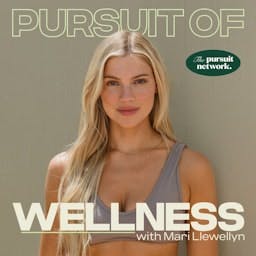.jpg)
Mindfully Integrative Show
Welcome to the Mindfully Integrative Podcast! We are dedicated to featuring inspirational and successful individuals who have embraced mindful investing to achieve optimal integrative wellness. Our podcast dives into all aspects of mindfully incorporating integrative functional health into our lives, aiming to help create a more balanced and fulfilling life. New episodes are released every Friday and cover a wide range of informative and entertaining topics, interviews, and discussions.
We explore a mindful approach to the mind-body connection with guests discussing various topics in integrative holistic health. This includes areas such as whole health, functional medicine, spiritual health, financial health, mental health, lifestyle health, mindset shifts, physical health, digital health, nutrition, gut health, sexual health, body positivity, family health, pet health, business health, and life purpose, among others.
Dr. Damaris G. is an Integrative Doctor of Nursing Practice, a Family Nurse Practitioner, a mom, and a veteran. For collaboration, interviews, or to say hi, you can contact her via email at damaris@mindfullyintegrative.com. You can also find her on LinkedIn at or https://www.linkedin.com/in/damarisdnp/. To join our membership and access resources, visit our website at https://mindfullyintegrative.com .
Please note that the information shared here is for informational and educational purposes only and should not be considered medical advice. Always consult with a physician or other licensed healthcare provider when making healthcare decisions. Enjoy the podcast!
Mindfully Integrative Show
Mastering Mindful Eating: Strategies to Avoid Overeating and Enhance Wellness
Are you often finding yourself at the mercy of overeating? Let me, Dr. Damaris Maria Grossman, be your guide to breaking free from this common struggle. As we journey through thoughtful strategies for mindful eating, you'll be empowered to enhance digestion and satisfaction at every meal. Discover the art of savoring your food, and how the strategic use of smaller plates and keeping tempting treats out of sight can revolutionize the way you approach your diet. With hydration tips and insight into the relationship between stress and eating, this episode promises to equip you with the tools for a more mindful and controlled relationship with food.
When the festive season or social gatherings beckon with their array of indulgences, arm yourself with the techniques shared in this episode to navigate through with your health goals intact. I'll walk you through the proactive steps you can take, such as bringing healthier options to share and why an apple before a party isn't just a wise choice—it's a game-changer. Learn how the simple act of toothbrushing can become your ally against the lure of extra helpings. More importantly, we'll delve into stress management and the transformative power of mindful breathing and regular exercise, providing a pathway to not just healthier eating habits, but a more harmonious way of life. Join me on this vital quest for balance and wellness that extends beyond the dinner plate.
Sponsor Affiliates
Empowering Your Health
Get YOUR Own
Joburg Protein Snacks
Discount Code: Damaris15 Or Damaris18
Feeling need to Lose Weight & Become metabolically Healthy
GET METABOLIC COURSE GLP 1 REseT
This course is designed for individuals looking to optimize their metabolic health through integrative and functional medicine approaches. Whether you're on a GLP-1 medication or seeking natural ways to enhance your metabolic function, this course provides actionable steps, expert insights, and a personalized roadmap sustainable wellness.
Are you feeling stressed, tired, or Metabolism imbalanced?
Take advantage of our free mindful steps to help improve your well-being.
ENJOY ONE OF our Books
Mindful Ways Health Wealth & Life
https://stan.store/Mindfullyintegrative
Join Yearly membership ALL IN ONE FUNCTION HEALTH
Ask Us for help...
Hi, how are you? This is Dr Damaris Maria Grossman, and today's healthy tip is talking about overeating and how do you avoid it. What is tips in that and what exactly is overeating? You know you are. There is seriousness when those that overeat. It can cause increase in heart and lung conditions, increase obesity and many studies have shown increase in diabetes, obesity and overall health issues. Almost about 40% of the population increased in obesity by just overeating.
Speaker 1:Now how do we avoid this and or get yourself into the right mindset? So, as someone that says you know to have a mindful way each and every day, one thing that I do is I talk a lot about our overall habits and mindful eating is part of the equation, because food is medicine and what you put into your body is a direct reflection on how you feel and what your life may be, because your cells are talking to each other and they're interconnected and the energy within kind of disseminates without. So let's go by the first tip. Let's talk about limiting distractions. Now how do you limit distractions? That means you don't watch TV, have the phone maybe like background music when you have time to eat, you're eating, so it's kind of doing like one thing at a time. I know that is not always the case every single day, but I would recommend majority of your meals, especially dinner or the biggest meal, to limit your distractions. There's been many of studies that have shown when you limit your distractions you eat less. When you don't limit your distractions, you're mindless eating and very mindful of the foods, meaning you're eating so much until you're full instead of intuitively feeling if you're full. There's a complete difference. You kind of your hunger gets even more and then sometimes you even find yourself craving those carbs and those sugars, which then will in turn actually make you eat more.
Speaker 1:The second part of the equation is how do you eat slowly? I talk about this a few times, about if you're going to eat extra slow or the proper way of digestion is from the mouth all the way down to the anus, all the way down to our GI tract. The proper way of eating really is to have about 30 bites per meal, per food. That is quite difficult for the average person, but if you actually did that, you would actually eat less food in turn and your portions would be smaller because you would notice your body is triggered to eat less and substantially. Your mind and the hormones and the hunger hormones and your satay, as they call it, is satisfied to eat and hunger, and if you're not, will feel full. So can you imagine doing about 30 bites, 20 to 30 bites per something? I don't always do it, I'm not perfect either, but when you do and you are more in tune with that, you'd be surprised how much fuller and aware you are of your eating habits.
Speaker 1:The third big one, as I tell people, is try to think about your portion size. What are you putting in the body? How much are you doing? And then, are you in this good, caloric, dense foods, nice, good quality whole foods, veggies, fruits, or are we just thinking of the processed cookies, you know, cakes, breads, because they're easier, or a fast food option because it's easier? You know, think in a way prepping for a week and portion out your meals so that you might have a better option. I always say a smaller plates when eating. I always go for the lunch plates. Half of my plate should have more of a veggie option and fruit and the other part more on the protein, and I would avoid when you do bulk orders and if they may be more affordable, try to still portion out your meals and portion out your food. So say, if you got a bulk order of some carb loaded thing, try to portion them out into bags so that you have them serving size ready, instead of just sitting down to have a whole bag of popcorn, a whole bag of chips. Try to have individual, smaller plates, smaller bowls, things of that nature. Avoiding those temptations, those sugary foods, sugary drinks, you know, really thinking about the importance of hydration and water and how that is an integral part in your overeating and mindful eating. Now how do you avoid those temptations?
Speaker 1:When you wanna overeat, sometimes you may have to literally remove it from your pantry and in your life. That doesn't mean you completely get rid of it. It just means you have to just kinda see if there's triggers or things that may spark up stressful or emotional eating. So I'd say for myself ice cream is one, so I don't usually have that available. I have to go and walk someplace to go get it. Or I take a little bit or I do a portion size. So it's one portion sized pop or something that might be like 50 calories is all I can have for that treat. Another way I say is when you're going to eat or have some salads, I say have the dressings and things on the side. That's always a benefit for you.
Speaker 1:Consider high caloric, quality foods and avoid the process options. Again, when you have these moments of not wanting to be mindful and you get bored, if you can keep your hands busy or drinking water, or crocheting, or reading a book or listening to music, you'll find yourself less going to foods or during a boredom. The majority of the time when you're overeating, it's either boredom, it's because you are thirsty or because you are tired. Really think and be in tune with your body to see where you're at and what is going on. My next tip is how do I fill my day with more fibrous foods? So when you have more of a fibrous kind of meals in addition to protein, your body feels a little bit more full. So things that are more fibrous are the veggies, the whole foods, little nuts, oats, whole grains, whole fruits, big berry and oranges, things of that nature, things that will make you satisfied but still gives you that full feeling. In addition to that, of course, pairing your meals with quality protein. Quality proteins can include yogurts, could be nuts, could be non-dairy milks, even beans, peas, whole grains, fish, poultry, lean meats and, if needed, you can do protein powders as an option in the morning or in the evening if you're going to be working out, or my favorites are egg whites, so I always do those as an option and keeping.
Speaker 1:My next tip would then be keeping positive, trying to be kind to yourself, Because those mindful tips and those mindful ways each and every day is you got to reset and be okay with where you're at today, tomorrow and the next day. And just because one moment you may have had and you may have overeat and some food the next meal does not mean that your whole day is ruined. Understand that sometimes the stress levels come up. Okay, let's reset and kind of get yourself back into the game. You got this.
Speaker 1:Another option I say is always try to bring a healthy option to parties and holiday things, to things that you're going to veggies or a dish Pair, water with an alcohol beverage or between meals so that you're more full. Maybe even have an apple before you go out or before you're going to have these bigger gatherings or such. And the last one, if that's available to you, is you would actually want to brush your teeth, because brushing your teeth will help kind of get rid of those that excess food on the, on the your mouth and and you're less willing to eat as much when you brush your teeth You're like, oh, I just brushed my teeth. And then my number one tip out of all of this, you know you're going to be mindful about your eating, you're going to limit your overall alcohol, you're going to take the time to, you know, really be in tune with your body. But it would be to try to see if you can reduce and transform your stress, because you, as I had said to you before, overeating really has a boredom component, a hunger component, a tired component and or the ghrelin hormone, where it makes you think that you're hungry and you're not, and the stress from the cortisol levels and from other stress things. When you manage some of that stresses is a normal response, good and bad. It's just a matter of how do we transform it so that it does not take over our life.
Speaker 1:Things that I always recommend mindful breathing. Try to see if you can have some sort of exercise regimen for you. I love yoga and meditation. I have some breathing and relaxation techniques on my YouTube and on the podcast and then just taking moments to just focus in and be kind to yourself, really give yourself moments to realize it's okay, I'm all right. I hope some of these helped and that you can find a little bit of mindful way each and every day, and this overeating tips have helped and you have a great day. Thanks for joining in.
Podcasts we love
Check out these other fine podcasts recommended by us, not an algorithm.

The Dr. Hyman Show
Dr. Mark Hyman
Functional Fertility with Dr. Kalea Wattles
Kalea Wattles
On Health for Women
Aviva Romm
Save Yourself With Dr. Amy Shah
Dr. Amy Shah
Huberman Lab
Scicomm Media
The Peter Attia Drive
Peter Attia, MD
The Metabolic Classroom with Dr. Ben Bikman
Insulin IQ
FoundMyFitness
Rhonda Patrick, Ph.D.
Change Your Brain Every Day
Dr Daniel & Tana Amen
The Dr. Josh Axe Show
Dr. Josh Axe
Pursuit of Wellness
Mari Llewellyn & Pursuit Network
Feel Better, Live More with Dr Rangan Chatterjee
Dr Rangan Chatterjee: GP & Author
The Level Up Podcast w/ Paul Alex
Paul Alex Espinoza
Faith Over Fear
Jennifer Slattery, Faith Over Fear Author and Speaker
